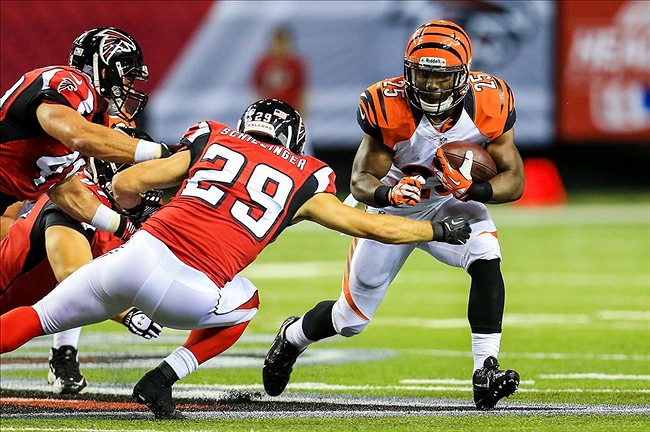As I’ve been immersed in the football and fantasy football season for the past weeks, a thought has been sneaking up on me bit by bit. If financial reporters are not allowed to purchase stocks and political reporters are not allowed to make contributions to candidates or even make their own political views public… why are we okay with sports reporters participating so passionately in fantasy football leagues?
And participate, they do: At the 13 minute mark of the 10-10-13 edition of ESPN’s fantasy football podcast (yes, I listen to it) fantasy sports pundit Matthew Berry mentioned that sports reporter Ed Werder tweeted:
Jason Garrett has benched underachievers, reconfigured lineups so does Terrance Williams start ahead of Miles Austin, returning from hammy?
— Ed Werder (@Edwerderespn) October 9, 2013
To his credit, Berry told the audience that this was not official reporting from Werder but instead was conjecture. Berry built off of this with his own conjecture that perhaps Werder has some inside information on the situation based on his long history covering the team and the fact that Werder had picked up Terrance Williams to be on his fantasy team in a league with Matthew Berry. Berry often refers to a sixteen team league he plays in with other ESPN employees called the War Room. This league (if this isn’t a clever hoax) can actually be viewed here and its membership includes reporters and analysts like Adam Schefter, Michael Smith, Trent Dilfer, Mark Schlereth, Ed Werder, Chris Mortensen, and Stephania Bell. Is there money riding on the outcome of this league? Although that is common in most fantasy leagues, it’s hard for me to imagine ESPN would allow their employees to gamble on sports in this way. Then again, ESPN has moved off it’s traditional ignore-that-gambling-exists stance and now has a gambling blog and allows its top personality, Bill Simmons, to openly talk and write about gambling. Regardless of the money, given how often and publicly the War Room league is talked about, it seems to be fiercely competitive.
Berry’s investigative reporting into reporters’ fantasy actions seems to be becoming a habit. On the same day he tweeted about a fantasy trade made by ESPN reporter Chris Mortensen and former NFL player, now ESPN analyst Trent Dilfer:
Dickson. Hmm. What does Mort know? RT @all_biz Another war room league deal. @mortreport trades Mendenhall to @TDESPN for Ed Dickson
— Matthew Berry (@MatthewBerryTMR) October 10, 2013
What can we make of this? Berry’s job is helping readers and listeners get an edge in their own fantasy leagues. He is suggesting that we use the information that reporter Ed Werder thinks it’s possible that Dallas receiver Terrance Williams supplants Miles Austin in the starting lineup or that Chris Mortensen thinks a lot of tight end Ed Dickson or not very much of running back Rashard Mendenhall to help our fantasy teams. I am open to that use of this information (Terrance Williams is now on my fantasy team) but I am suspicious of it at the same time.
My suspicion is multi-faceted:
- Fantasy owners get attached to the players on their teams. As I mentioned in a post on the arrest of Aaron Hernandez for murder, I found it harder to believe that he was capable of that crime because he had been on my fantasy team for years. Fantasy owners become fond of their players and are often prone to overvaluing them when engaging in trade negotiations with another fantasy team. Is it possible that a sports reporter would write favorably about a player because of the unconscious instinct to overvalue the players on one’s own fantasy team?
- Fantasy owners promote their players in an effort to convince other people to trade for them. The honorable art of trading in fantasy is finding a team whose strengths match your weaknesses and vice versa so that a trade can work out to benefit both teams. The disreputable art of trading in fantasy is convincing someone that a player who you think is not that good is going to be REALLY REALLY GOOD. I’ve certainly embellished my belief about a player’s prospects to a friend I was trying to trade him to. Is it possible that a reporter might use his or her twitter account to drive up the value of a player they are trying to trade? What about filing an article for the same purpose?
- Finally, (and here’s where it gets really crazy,) whether as part of an intentional act of fantasy negotiation or through unconscious bias generated by owning a player, isn’t it likely that something a member of the media says or writes about a player will eventually affect how a real football game is played? A negative article can motivate a player to vengeful greatness or shake a player’s confidence and cause his play to suffer. A carefully placed rumor could cause a divide between teammates or modify how a coach thinks about a player.
It is possible that I’m on to something incredibly profound or that it’s 11:11 pm on a Friday, it’s been a long week, and I’ve watched the Matrix too much. Either way, I not sure I’ll ever be able to listen to an “NFL rumor” again without thinking “I wonder whose team that player is on in the reporter’s fantasy league…

